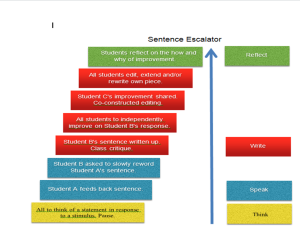This week’s post is my response to two excellent blog posts I read last week: Alex Quigley’s – here – and Tom Sherrington’s – here. Both posts discussed Ron Berger’s ‘ethic of excellence‘, pointing out the incredible potential of Berger’s approach to redrafting, feedback and resilience. Both posts also urged readers to watch the ‘Austin’s Butterfly’ video which exemplifies Berger’s approach:
‘Austin’s Butterfly’ was a revelation to me, the equivalent of a teaching epiphany. The gauntlet had been thrown down – I knew I had to respond right away in my own classroom. Much of my thinking at the moment revolves around two interrelated areas: how to guide my students towards making conscious decisions about sentence structure choices, but also how to help my students develop an academic register during verbal feedback.
So this week I have invented and developed what I am going to dub ‘The Sentence Escalator’, a way of transforming unstructured verbal feedback into lovingly and diligently crafted sentences. The chart below shows how it works, from bottom up (you will probably need to click on it):
The initial verbal comment is moulded into shape, extended-upon – or both – in a way that involves the whole class. The teacher’s language expertise is also important: at times a sentence must be scrapped or completely reorganised. “A sentence is never finished,” has become my new mantra (in fact, this week I have also banned the word ‘finished’ from my classroom). Ultimately, the long-term aim of this task is to ‘close the gap’ between the original verbal comment and the final written sentence, which is why it is important to reflect on the process for next time.
Here is how my year 9s ‘escalated’ a sentence when writing from the perspective of a WW2 soldier:
1. Verbal comment from Student A: “He’s drinking alcohol to calm his nerves.”
2. Verbal sentence from Student B (written up on the board): “I am drinking an alcoholic beverage to calm my nerves and desperation to stay alive.”
3. Written improvement (after extensive class critique) from Student C: Trembling in fear, I picked up a bottle of whiskey, my hand shaking like a boat.
4. After more editing on the board: Trembling, I grasp a bottle of whiskey, my hand shaking like the boat we stand in.
Here is how my year 11s extended an idea when analysing the effectiveness of language in an extract from Jessica Ennis’ autobiography:
1. “The word ‘pluck’ is like she’s lucky.”
2. “The word ‘pluck’ could have connotations of luck.”
3. The verb ‘pluck’ could have connotations of luck because she has been chosen out of many, yet also could have connotations of talent because she has been specifically chosen.
4. In a student’s book: The verb ‘plucked’ could have connotations of luck, perhaps suggesting to the reader that Ennis is very fortunate to be in the situation she is in; however, this is actually very much contradictory with the truth about athletes (concerning how much effort and hard work they put in to achieve their goals). This illustrates Ennis’ intention to make herself seem like any other girl her age in an effort to appear modest, which links into her description of herself as being ‘ordinary’.
Aside from its beautiful simplicity, I see a number of advantages of this strategy:
• It begins to instil Dweck’s ‘Growth Mindset’ – the perfect sentence must remain elusive and as a result we can all write a bit better (teacher included).
• It allows for the seamless integration of language skills and knowledge. As basic concepts are built-upon, so the sentence (or sentences) are extended or scrapped in favour of more complex alternatives. Imagine a lesson, or series of lessons, where a simple sentence containing a simple concept was gradually built upon. It certainly has a cross-curricular appeal.
• It allows for swift and immediate teacher-facilitated feedback on writing skills.
• It encourages the teacher to hone the language skills required for their subject. If the teacher is unable to model the academic ‘genre’ of their subject, how can students – especially those who are not exposed to such language at home – be expected to write well in this genre?
So, there you go. My mini-butterfly has taken wing…
Similar articles
My friend Gav McCusker has been utilising a similar strategy called layered writing when helping students to elaborate on their ideas.

Pingback: Modelling writing… and the meaning of life | Reflecting English
This is a great idea. I’ve got a Y10 Business Studies group for whom this would be really useful. How long(ish) did it take to get through all the stages?
It does take a while, but I think it’s worth it. You can do it in 15 minutes, but it really depends on the ability of the class and what it is you want them to be able to write.
Reblogged this on Primary Blogging.
Pingback: The Goldfish Bowl » Revision before redrafting
Pingback: It takes time to write | Reflecting English
Pingback: Strategic marking for the DIRTy-minded teacher | Reflecting English
Pingback: Better learning intentions | Belmont Teach
Pingback: A benchmark for the future | Reflecting English
Reblogged this on The English Hub .
Pingback: My butterfly: the sentence escalator | Marking ...
Pingback: A directory of my writing posts | Reflecting English
Pingback: 4 Steps to Efficient Effective Marking by @Powley_R | UKEdChat - Supporting the Education Community
Pingback: A directory of my posts on teaching writing | Reflecting English
Pingback: Why I Prefer Twitter – All Ears
Pingback: Week 10 Sunday 27.11.16 | msmcclusky